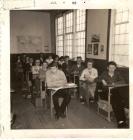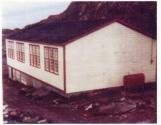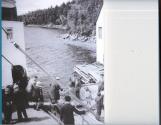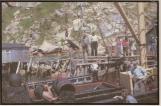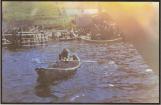1
While the remote locations of these coastal towns gave its fishermen access to some of the best fishing grounds, they came at the unfortunate price of inaccessibility. This presented a number of challenges for those living in these towns, primarily the unavailable comprehensive healthcare and education.The only form of transportation to and from these towns was by boat, which made the trip into town to see a doctor inconvenient and difficult. This also made it difficult for doctors to visit frequently, and checkups were usually only scheduled few times a year. Some towns received annual visits from the M/V Christmas Seal, a Canadian medical ship operating in Newfoundland. The ship was converted in 1947 into a floating clinic, and sailed to isolated coast towns to screen residents for tuberculosis and provided vaccinations.
2
The M/V Christmas Seal, a medical vessel which provided medical care to outport communities1950-1960
Twillingate, Newfoundland, Canada
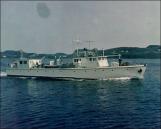
3
Some towns had a local clinic, usually called the surgery, for minor illnesses and injuries. Women working as midwives primarily delivered the babies of these isolated communities, some even travelling between towns to where care was needed. Without access to a fulltime doctor, townspeople had to rely on homemade cures and local skills. Common cures for minor injuries included making poultice for a 'rising finger', or infection, and treating cuts with turpentine or iodine. Other remedies included things like pure alcohol, Kerosene, Vicks, hot flannel, Minards Liniment, Friars Balsam, vinegar, molasses, peppermint or ginger ale.4
The Bonnavista, one of the coastal boats that provided transportation to Stone Valley1950-1960
Stone Valley, Newfoundland, Canada

5
Another problem within the communities was the issue of education. Due to population sizes and number of students, classrooms were primarily one room school houses. Grade levels offered at the schools depended on the availability of teachers qualified. Towns who could not find teachers usually didn't have the means to send the children to other towns, either due to the issues of transport or religious affiliation. If students wanted to complete a grade level not offered, the opportunity was usually not available to them, which made it difficult for those who wanted further education.6
Inside view of St. Matthew school and its teacher1960-1970
Pass Island, Newfoundland, Canada
 Credits:
Credits:Ken Bobbett
